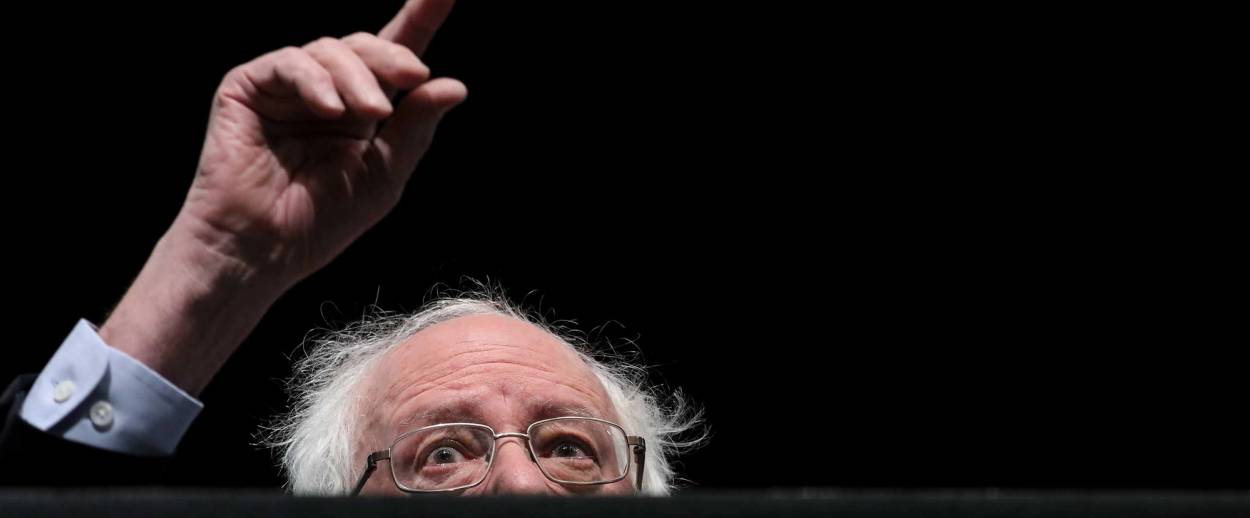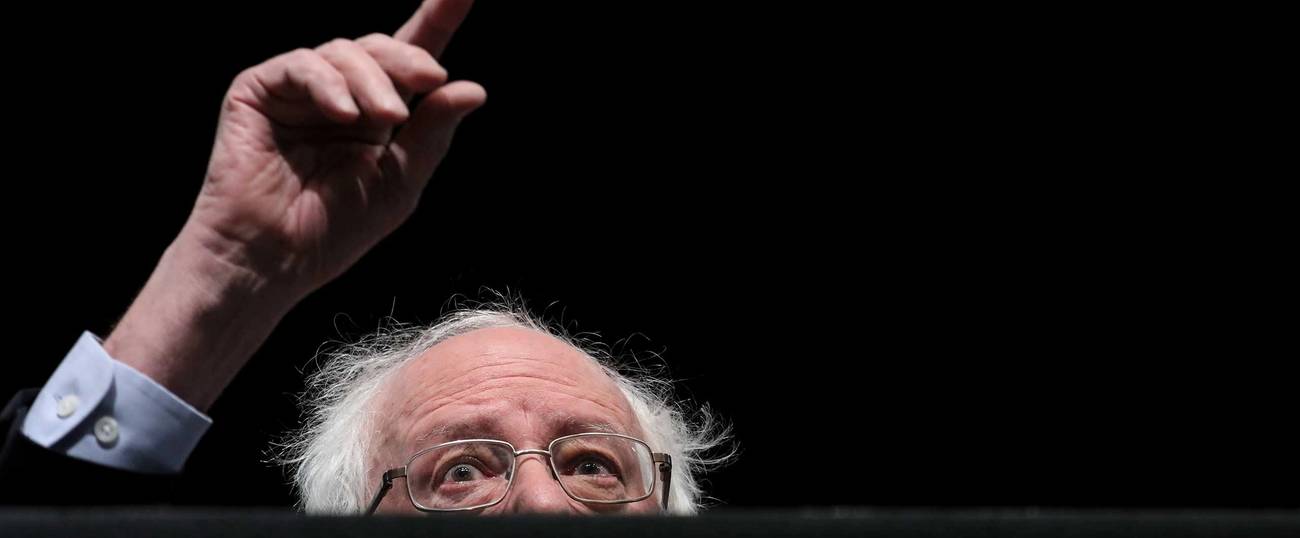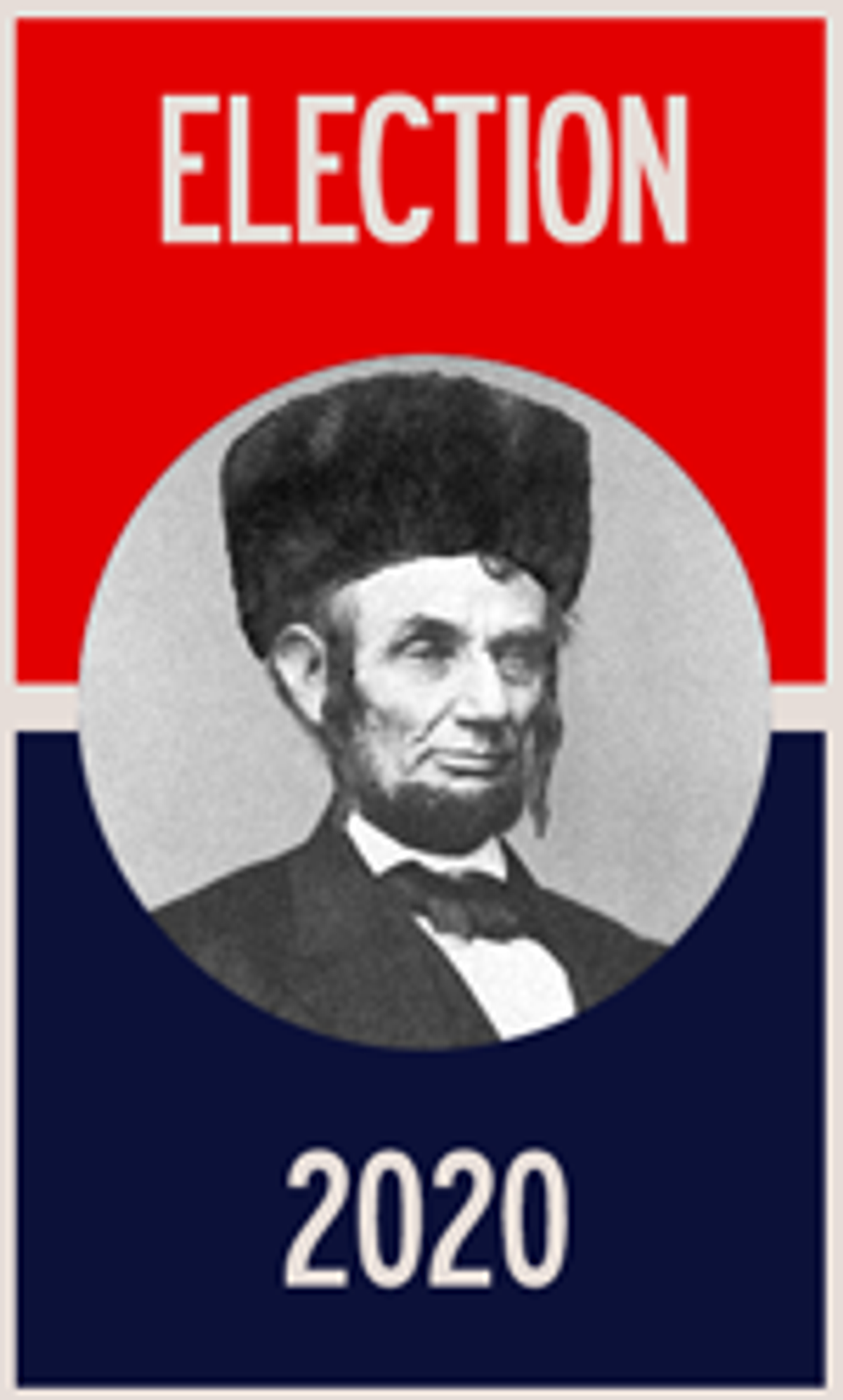The 11% Majority
Most Jews—and many Democrats—believe Bernie Sanders is a dangerous radical




Hardly a Democratic presidential debate has transpired without Sen. Bernie Sanders criticizing former Vice President Joe Biden for his vote authorizing the Iraq War. It’s a fair criticism, and one that Sanders, who opposed the war as a congressman, is well positioned to make. But as the Vermont socialist edges inexorably closer to clinching the party’s nomination, why hasn’t Biden—or any of the other candidates—confronted him with some version of the following?
“OK, Bernie, let’s grant that the Iraq War was a catastrophe, and that you were right in opposing it. But when it came to the most important foreign policy issue of the second half of the 20th century—the attempt to enslave humanity by totalitarian communist dictatorships—you were, at best, a passive observer, but more accurately a fellow traveler.”

Sanders, noted the Washington Post last week, has “not yet been subjected to a negative paid advertising effort.” This is incredible. For all the accusations of “favoritism” Sanders and his acolytes have flung at the Democratic establishment since he challenged Hillary Clinton four years ago (rather galling when you consider that Sanders is himself not a member of the Democratic Party), the Democrats have treated him with kid gloves. It’s long past time they pointed out how far out of the mainstream Sanders’ views are on important subjects that have nothing to do with health care, or economic “fairness” or “justice.”
Republicans are salivating at the prospect of facing Sanders in the general election and Democrats are rightly terrified of the potentially disastrous down-ballot effects his nomination could wreak. Democrats took back the House in 2018 by running moderates in swing districts; not a single candidate endorsed by the Sanders-aligned Justice Democrats won a seat held by an incumbent Republican. But to stop Sanders from hijacking their party as Trump did the GOP in 2016, mainstream Democrats will have to do more than challenge the septuagenarian socialist’s electability. They need to focus on the very real, substantive ideological differences, namely, his decadeslong record of sympathy and support for leftist autocrats, that put him far outside mainstream Democratic Party traditions—and which explain why America’s first serious Jewish presidential candidate garners only a tiny fraction of support from Jewish Democratic Party voters.
Bernie didn’t just oppose America’s Cold War excesses. He was often on the other side. America’s actions in Vietnam, he told a classroom of impressionable youngsters in 1972, were “almost as bad as what Hitler did.” In 1980, when Americans were tying yellow ribbons to express solidarity with our diplomats held hostage in Iran, Sanders aligned himself with the Socialist Workers Party, hosting an event at which its presidential candidate condemned “anti-Iranian hysteria around the U.S. hostages.”
As mayor of Burlington, Sanders earned the sobriquet “Foreign Minister” for the series of Potemkin village tours he took of America’s socialist adversaries abroad. When a constituent wrote a letter complaining about his words of praise for the Nicaraguan Sandinista regime, which had incarcerated thousands of political prisoners and forcibly relocated native tribes, Sanders responded, “The temporary suspension of certain civil liberties is considerably more complex than your letter indicates.” Sanders is like the guy we all knew in college with the Che Guevara T-shirt. Except, at 78, he’s still that guy.
When Alexander Solzhenitsyn moved to Vermont, Sanders never once met with the man whose personal testimony of the gulag won him the Nobel Prize for literature. But he did make time to travel halfway across the world to yuk it up with Solzhenitsyn’s jailers in the Soviet Union. After venturing to Cuba, a one-party state that interned homosexuals in concentration camps, Sanders returned awestruck. “I did not see a hungry child,” he gushed. “I did not see any homeless people. Cuba today not only has free health care but very high-quality health care.” (Indeed, Cuban health care is so “high-quality” that a cancer-stricken Fidel Castro summoned a Spanish doctor to treat him.)
While ritual self-flagellation is always demanded of Joe Biden for his single vote authorizing the Iraq War, Sanders’ opponents are oddly reluctant to ask him about his decadeslong record of propagandizing on behalf of leftist tyrants and mass murderers. Nor can these political commitments be waived off as mere youthful indiscretions. Sanders instinctually sides with any foreign head of state or revolutionary leader deemed “progressive,” no matter how autocratic or ruthless.
Some recent examples illuminate the continuing strength of Sanders’ reflexive support for dictators who abuse their people while fashioning themselves advocates for “the people.” Sanders refuses to call Venezuelan strongman Nicolas Maduro a dictator, and is the only candidate to defend the Bolivian autocrat Evo Morales, who tried to steal an election, as the victim of a “coup.” Just this week, Sanders reiterated his admiration for Castro’s literacy programs, which could have a significant impact in Florida voting should Democrats put him at the top of the ticket. In that same town hall, he also expressed his sense of wonder at the Chinese Communist Party’s anti-poverty efforts in a way that rivals the useful idiocy of George Bernard Shaw.
Sanders seems to think that adding the adjective “democratic” to his political self-identification of “socialist” negates his sordid history of support for tyrants. But there isn’t just one type of “socialism,” there are many—some laudable, and some scary. Throughout the Cold War, some democratic socialists and labor union leaders became passionate anti-communists because they understood—better than most—that totalitarian communism didn’t liberate workers but enslaved them. In Spain, East Germany, Russia, and everywhere else communists competed with socialists for power, democratic socialists were the first ones thrown up against the wall.
Sanders supporters frequently insist that the American people, subjected to a century of incessant, right-wing, red scare-mongering, have adopted a cartoonish view that conflates European social democracy with North Korean-style communism. There is some truth in this analysis—though Sanders himself has expressed plenty of enthusiasm for communist tyrannies, too. Sanders, however, has also benefited from another form of historical ignorance, namely, the elision of crucial distinctions between various strains within the socialist political tradition.
The strain of socialism that Sanders represents is in fact quite far from the democratic socialist traditions he and his followers sometimes lay claim to. In fact, Sanders’ politics, especially his embrace of totalitarian regimes, would be anathema to those institutions and individuals—Jewish and Jewish-friendly—which can claim the most credit for actualizing the best of democratic socialist ideals in America, like the Workmen’s Circle, organizers like Michael Harrington and Bayard Rustin, intellectuals such as Irving Howe and Michael Walzer, Dissent magazine, and giants of the American labor movement like David Dubinsky, Jay Lovestone and Al Shanker.
All of these figures made massive contributions to the struggles for racial equality, economic fairness, and a more democratic world—and anti-totalitarianism, specifically the rejection of leftist tyrannies, was a foundational pillar of their politics. They specifically abhorred men like Sanders who attempted to erase distinctions between democrats and totalitarians on the left. Sanders emerges from an entirely different political lineage, that of anti-anti-communism. While he today invokes Harry Truman in defense of his brand of democratic socialism, Sanders must know how disingenuous this historical appropriation is. Though Sanders hasn’t had a new idea since the Roosevelt administration, he’s not old enough to have been politically active in 1948. If he was, he would undoubtedly have supported Henry Wallace and his fellow-traveling Progressive Party and denounced Truman—the man who dropped the atomic bomb on Japan, lent military aid to anti-communist fighters in Greece and Turkey, and helped create the North Atlantic Treaty Organization—as a warmongering Cold Warrior.
Sanders has been criticized for the aggressiveness of his supporters, and he has half-heartedly tried to calm them down by occasionally muttering things like “There is no room in the political revolution for abuse and harassment online.” But such unpleasant behavior is an inherent function of his brand of holier-than-thou utopianism. If you’re running on a platform decrying our country’s entire political, economic, and social system as rotten to the core, if you believe that America’s world role has almost exclusively been for the bad, and that wildly better alternatives are easily available, then anyone who opposes your promised penny-ante nirvana becomes complicit in terrible evil. The next step of course is that you start attracting organizers who defend Stalin’s gulags and advocate reeducation camps for Americans not sufficiently enthusiastic about your “revolution.” It’s why Sanders, despite his occasional, perfunctory admonitions for his activists to play nice, is ultimately willing to overlook their belligerence and bigotry.
If Democrats are foolish enough to nominate Sanders, they will be handing a major American political party over to a left-wing Ron Paul, a man who spent his entire career speechifying in the unexamined margins of American political life, accumulating a long rap sheet of dubious relationships, crackpot statements, and extreme proposals. A Sanders nomination would also complicate a major liberal narrative of the past four years, which is that Donald Trump is an agent of the Kremlin. That argument, which has become an article of faith for tens of millions of people in this country, will be difficult for the tyro Russia hawks on cable news and within the Democratic Party to sustain if they nominate a man whose most profound impression from his Soviet honeymoon was the magnificence of the chandeliers in the Moscow subway.
All of this is to say that Democrats better start talking about Bernie Sanders’ ignominious fringe record on the left, and soon. The Republicans will not be so gentle.
***
Like this article? Sign up for our Daily Digest to get Tablet magazine’s new content in your inbox each morning.
James Kirchick is a Tablet columnist and the author of Secret City: The Hidden History of Gay Washington (Henry Holt, 2022). He tweets @jkirchick.